Why Are You Eating?
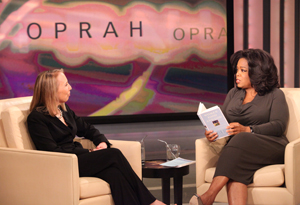
Over the years, Oprah has been very open about her struggles with weight. "You all know my story—the highs and lows and ups and downs. My skinny self, my fat self," Oprah says. But after all these years, Oprah says she's finally found the answer. "I have come across something so profound that I think [to everybody] who's ever felt that it's a losing battle, here is an opportunity to win. This has literally broken me open when it comes to my relationship with food, because if you struggle with your weight, what we're about to share with you today might be actually the first time in your life that you begin to understand the real reasons you are fat and allow those reasons to be a miracle for your life."
The discovery in question is author Geneen Roth's new best-selling book, Women, Food, and God. Readers say it's helping to free them from the vicious cycle of yo-yo dieting by getting to the core of why they're overweight.
Geneen says she was a crash dieter herself for many years, gaining and losing more than 1,000 pounds, but after finding herself on the brink of suicide, she had a breakthrough. "First of all, not dieting. Dieting leads to self-hatred and self-loathing, making you feel crazy about yourself," she says. "The other breakthrough is that your relationship with food, rather than being the curse, and rather than being the thing that you want to get rid of, is, itself, the doorway to the life you most want."
The discovery in question is author Geneen Roth's new best-selling book, Women, Food, and God. Readers say it's helping to free them from the vicious cycle of yo-yo dieting by getting to the core of why they're overweight.
Geneen says she was a crash dieter herself for many years, gaining and losing more than 1,000 pounds, but after finding herself on the brink of suicide, she had a breakthrough. "First of all, not dieting. Dieting leads to self-hatred and self-loathing, making you feel crazy about yourself," she says. "The other breakthrough is that your relationship with food, rather than being the curse, and rather than being the thing that you want to get rid of, is, itself, the doorway to the life you most want."
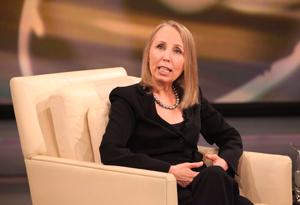
Having issues with weight is always about more than the food, Geneen says. "Your beliefs show up in your relationship with food. So if I'm eating when I'm not hungry or bored, I'm basically saying I can't feel these feelings. 'Life is too much for me. There's no goodness in my life except for food right here, right now,'" she says. "You're basically eating because you've given up on something, some part of yourself."
Oprah says she had an aha! moment when reading about how people's relationships with food mirrors their belief systems. "I realized that is what I have done, and so many other people have done, for years. You think that, 'I am so small that the pain is going to overwhelm me,' but really the truth is you've already experienced that pain," she says.
"Yes, you have, and what food does at that point is it doubles your pain, rather than make it go away," Geneen says. "You're still in pain about what you were in pain about before you ate, but now you've added a whole level of more discomfort which is: 'Oh, I can't believe I ate this. What's wrong with me? Am I ever going to get my life together? Is it ever going to get better?' Then you're feeling like a failure on top of the discomfort you were feeling before."
Oprah says she had an aha! moment when reading about how people's relationships with food mirrors their belief systems. "I realized that is what I have done, and so many other people have done, for years. You think that, 'I am so small that the pain is going to overwhelm me,' but really the truth is you've already experienced that pain," she says.
"Yes, you have, and what food does at that point is it doubles your pain, rather than make it go away," Geneen says. "You're still in pain about what you were in pain about before you ate, but now you've added a whole level of more discomfort which is: 'Oh, I can't believe I ate this. What's wrong with me? Am I ever going to get my life together? Is it ever going to get better?' Then you're feeling like a failure on top of the discomfort you were feeling before."

Lots of people understand why women and food are mentioned in the title of Geneen's book, but why God? Geneen says she isn't talking about God in the religious sense. Instead, she's talking about what she calls the source. "We each have this longing—we've had moments of awe and wonder in our lives. A lot of us don't call that God, but we know that something is possible for every one of us besides our daily lives, the daily grind. The way we get caught with errands and emails and taking care of other people. We feel that this possibility exists," Geneen says. "I'm talking about wonder and mystery and possibility ... or the feeling you have in nature. The feeling that everything is possible."
Oprah says that in reading Women, Food, and God, she has learned that a woman's relationship with food is directly related to how close she is to the source. "That's really what this book is about," she says. "The issue isn't really the food. It is about your disconnection from that which is real which we call God."
Oprah says that in reading Women, Food, and God, she has learned that a woman's relationship with food is directly related to how close she is to the source. "That's really what this book is about," she says. "The issue isn't really the food. It is about your disconnection from that which is real which we call God."
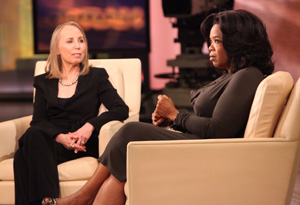
In Women, Food, and God, Geneen delves into why women turn to food even when they aren't hungry. "Obsession gives you something to do besides have your heart shattered by heart-shattering events," she writes.
The emotional struggle that accompanies overeating is familiar, Geneen says, whereas the "heart-shattering events" are often new and raw. "People are afraid that the pain will destroy them. Or the heartbreak, or the discomfort even. ... We don't actually know that we can feel those feelings without being destroyed by them," she says. "Getting up and living day-to-day and going through the stuff of day-to-day, that's difficult. But somehow we believe that food is cushioning it."
Oprah says even she turns to food when life gets hard. "There's still anxiety when I have to say no to someone," she says. "I still worry, 'What are they going to think' ... [That happened to me recently and] I did not eat a pound of potato chips. I ate a pound of lettuce. But it's the same thing. I've switched the drug from potato chips to lettuce."
In that moment, Oprah says she started questioning her actions. After saying no and standing up for herself, why was she so anxiety-ridden that she had to eat a bowl of lettuce? "I went back to what you had said in the book,” she says. “What I'm really feeling is every time I have ever been beaten by my grandmother. ... What I recognize as I'm stuffing myself with the lettuce is I still have that feeling of if I don't do what pleased the other person, then somehow that person has the power to annihilate me."
The emotional struggle that accompanies overeating is familiar, Geneen says, whereas the "heart-shattering events" are often new and raw. "People are afraid that the pain will destroy them. Or the heartbreak, or the discomfort even. ... We don't actually know that we can feel those feelings without being destroyed by them," she says. "Getting up and living day-to-day and going through the stuff of day-to-day, that's difficult. But somehow we believe that food is cushioning it."
Oprah says even she turns to food when life gets hard. "There's still anxiety when I have to say no to someone," she says. "I still worry, 'What are they going to think' ... [That happened to me recently and] I did not eat a pound of potato chips. I ate a pound of lettuce. But it's the same thing. I've switched the drug from potato chips to lettuce."
In that moment, Oprah says she started questioning her actions. After saying no and standing up for herself, why was she so anxiety-ridden that she had to eat a bowl of lettuce? "I went back to what you had said in the book,” she says. “What I'm really feeling is every time I have ever been beaten by my grandmother. ... What I recognize as I'm stuffing myself with the lettuce is I still have that feeling of if I don't do what pleased the other person, then somehow that person has the power to annihilate me."
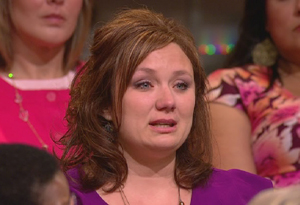
Conquering issues with weight starts with learning to love yourself, Geneen says. "People say, 'I hate myself and I hate my thighs and how do I start looking at myself and loving myself?' And sometimes I'll say: 'How would you treat a child who needed your love? Would you just whack them around and just say: 'Wrong! Bad. Look at your thighs, look at your legs'? No. Kindness. Only kindness makes sense. Only kindness ever makes sense."
It's especially important to treat ourselves as we would our children, because our children mirror our actions, Geneen says. One audience member says she's terrified that she's passing on her own food issues to her child. "My daughter, who just turned 7 yesterday, she said, 'I want you to take me home so I can change my clothes before school because my thighs are too big,' and she's the tiniest little thing. It kills me that I've taught her in seven short years to hate herself," she says.
Geneen says this mother's attitude toward herself is rubbing off on her daughter. "She sees her mom not liking herself and she's thinking: 'I love my mommy. I want to be just like my mommy. I'm not going to like myself either, that way mommy and I are the same,'" Geneen says. "That's a really good motivation for you to start being kinder to yourself, because ... it's not too late. It's never too late."
It's especially important to treat ourselves as we would our children, because our children mirror our actions, Geneen says. One audience member says she's terrified that she's passing on her own food issues to her child. "My daughter, who just turned 7 yesterday, she said, 'I want you to take me home so I can change my clothes before school because my thighs are too big,' and she's the tiniest little thing. It kills me that I've taught her in seven short years to hate herself," she says.
Geneen says this mother's attitude toward herself is rubbing off on her daughter. "She sees her mom not liking herself and she's thinking: 'I love my mommy. I want to be just like my mommy. I'm not going to like myself either, that way mommy and I are the same,'" Geneen says. "That's a really good motivation for you to start being kinder to yourself, because ... it's not too late. It's never too late."
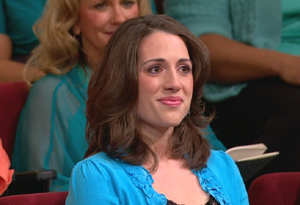
Geneen has helped countless women conquer their battle with weight. Jennifer, who has struggled with being both over and underweight, says she hasn't fluctuated in weight or dieted since attending one of Geneen's seminars. "What mostly clicked was recognizing that going to the food wasn't working and that what I was looking for wasn't in the food. So what I was trying to get rid of and what I was trying to not feel, it didn't help to be eating over it," Jennifer says. "The other thing that clicked was that there was a whole lot of pain there to look at. I needed to look at some of the layers, recognizing some of the beliefs that were keeping me at the weight where I was." Those beliefs, Jennifer says, were that she wasn't good enough, that nobody liked her and that nobody would accept her the way she was.
Jennifer's beliefs are similar to so many women's. "We somehow believe that if we hate ourselves enough, if we shame ourselves enough, we'll end up thin, happy, peaceful people," she says. "Somehow if I torture myself enough, I'll end up feeling great about myself and about my life, as if hatred leads to love and torture leads to contentment."
Jennifer's beliefs are similar to so many women's. "We somehow believe that if we hate ourselves enough, if we shame ourselves enough, we'll end up thin, happy, peaceful people," she says. "Somehow if I torture myself enough, I'll end up feeling great about myself and about my life, as if hatred leads to love and torture leads to contentment."
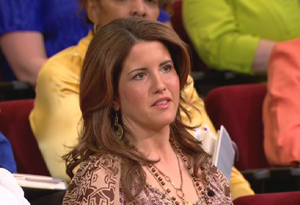
One common problem women have with weight is the feeling that once they hit a certain number, their entire life will improve. Alexandria says this was her struggle before Geneen helped her conquer her food issues for good. "I lost that notion of dieting and counting calories to really questioning and looking at my believes about my life," she says. "I trust that the hunger that I have, that I can feel my feelings and be with them separately and I can nourish my body with what it wants and trust it."
Today, Alexandria says it feels as if someone turned up the volume on her life. "This work really helped me kind of click some of the pieces of the puzzle into place, and it was about a year ago when I first started doing this work with Geneen—that's when it really accelerated using this as a doorway into my deeper self," she says. “I know I don't have to be finished with this work. I'm not a project to be constantly fixed and worked on. I'm whole right now as I am and everything we have, we need, is right in front of us at this moment. “
To jump-start the change in your life, Geneen says there are seven principles that should guide you. However, Geneen warns against turning these into a diet. "I call them eating guidelines, but I also call them the 'if love speaks' instructions. Because people make them into rules right away, then they have to rebel against them and break them," she says. "So don't make them into a diet."
Get Geneen Roth's eating guidelines
Read an excerpt from Women, Food and God
Today, Alexandria says it feels as if someone turned up the volume on her life. "This work really helped me kind of click some of the pieces of the puzzle into place, and it was about a year ago when I first started doing this work with Geneen—that's when it really accelerated using this as a doorway into my deeper self," she says. “I know I don't have to be finished with this work. I'm not a project to be constantly fixed and worked on. I'm whole right now as I am and everything we have, we need, is right in front of us at this moment. “
To jump-start the change in your life, Geneen says there are seven principles that should guide you. However, Geneen warns against turning these into a diet. "I call them eating guidelines, but I also call them the 'if love speaks' instructions. Because people make them into rules right away, then they have to rebel against them and break them," she says. "So don't make them into a diet."
Get Geneen Roth's eating guidelines
Read an excerpt from Women, Food and God



